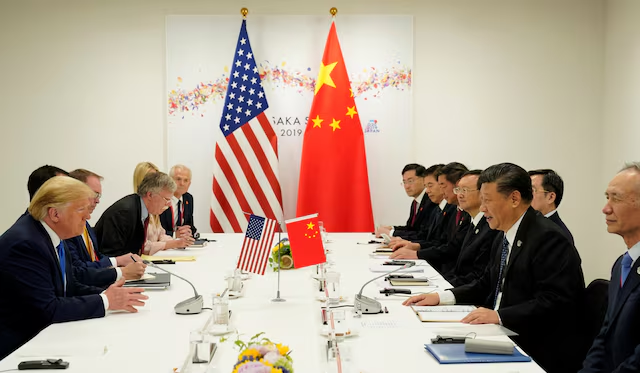News
Trump Ready to Meet Xi Jinping in South Korea, Says U.S. Treasury Secretary Bassent

U.S. President Donald Trump is set to meet Chinese leader Xi Jinping in South Korea at the end of October, Treasury Secretary Scott Bassent said, as both sides seek to ease tensions following new tariff threats and export restrictions.
By the end of last week, a renewed full-scale trade war between the world’s two largest economies seemed imminent after China announced a sweeping expansion of its rare earth export controls on Thursday. Trump responded a day later by threatening triple-digit tariffs on Chinese goods, rattling global markets and sending U.S.-China relations into turmoil.
Over the weekend, Bassent and China’s Ministry of Commerce sought to reassure businesses and investors across the Pacific, stressing continued dialogue between their negotiating teams and the possibility of extending the current tariff truce.
Still, the rhetoric from both sides remains firm.
“Tensions between us have eased considerably,” Bassent told Fox Business Network on Monday. He added that the two sides had “a lot of discussions over the weekend” and that U.S. and Chinese officials would hold staff-level meetings in Washington during this week’s annual World Bank and IMF gatherings.
“Implementing 100% tariffs isn’t inevitable,” Bassent said. “Despite last week’s announcement, relations are good. Communication channels are open again, so let’s see what happens next.”
He confirmed that “President Trump has said tariffs won’t take effect before November 1. He will meet Chairman Xi Jinping in Korea. I believe that meeting is still on track.”
Trump and Xi are expected to meet on the sidelines of the Asia-Pacific Economic Cooperation (APEC) summit hosted by South Korea at the end of October.
In a statement on Tuesday, China’s Ministry of Commerce confirmed that a working-level meeting had taken place the previous day, highlighting earlier talks in London, Stockholm, and Madrid that resulted in a 90-day tariff extension.
However, the ministry warned that “the United States cannot demand negotiations while threatening new restrictive measures.”
Over the weekend, officials from both nations appeared to trade blame for the renewed risk of a trade war.
U.S. Trade Representative Jamieson Greer said on Sunday that China had delayed responding to Washington’s call after its rare earth announcement, calling it “an attempt to gain leverage.” Meanwhile, China’s commerce ministry criticized the U.S. for adding Chinese firms to its trade blacklist and imposing port fees on China-linked vessels.
Following Bassent’s comments suggesting that trade talks were back on track, Wall Street’s main indexes closed up as much as 2.2% on Monday, and Asian markets opened slightly higher on Tuesday.
Markets largely shrugged off the prospect of reciprocal port fees, and shares of Chinese shipping giant COSCO — seen as one of the most exposed companies — rose over 2% in Shanghai, reaching a three-week high amid a share buyback boost.
Both Sides Preparing for a Fight
Despite the diplomatic reassurances, both sides appear ready for confrontation, accusing each other of endangering the global economy.
“China is a command-and-control economy,” Bassent said. “They won’t control us — and we won’t be controlled by them.” He added that the White House is in contact with allies and expects support from European countries, India, and Asian democracies.
Meanwhile, Beijing defended its new export licensing regime, saying it aims to “jointly safeguard the security and stability of global production and supply chains.” Analysts warn the new rules could disrupt manufacturing for products ranging from cars to washing machines — even when no Chinese company is directly involved in production.
In an interview on Mornings with Maria, Bassent said the U.S. would reject China’s licensing requirements outright.
China’s Ministry of Commerce maintained, “Our position remains unchanged: if the U.S. wants a fight, China will respond to the end. If it wants dialogue, our door is open.” The statement concluded by emphasizing that both leaders should “preserve the hard-earned progress achieved through consultation” following their recent discussions.
